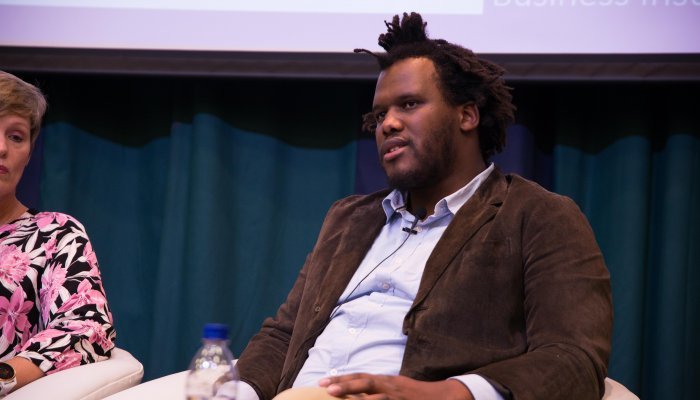The recent Fintech Disruption 2019 conference at GIBS attracted tech start-ups and representatives from the banking, insurance and finance industries alike – indicative of the way the conversation has shifted from “fintechs will put banks out of business” to the need for collaboration between disruptors and incumbents.
Interestingly, unlike many other fintech-centric events where the focus is on shiny new technologies, fintech capabilities and what incumbents can offer to lure tech players into partnership, discussion at GIBS centred around current challenges and mapping out the foundational requirements for the successful future of financial services, as well as laying out lessons learned so far in South Africa’s nascent fintech environment.
Open banking is about banks and financial institutions opening up their APIs to third parties.
Open banking and friendlier regulation
Nedbank has recently launched the first API* platform in Africa to align with international standards. Marco Vidulich, digital architecture executive, Nedbank, outlined the bank’s journey, explaining how the Nedbank API_Marketplace enables technical partners to use bank’s data and financial capabilities to create digital solutions that integrate with Nedbank’s standard, secure and scalable APIs.
Open banking is about banks and financial institutions opening up their APIs to third parties. It allows users to share their financial data securely with apps and services. PayPal is a good example of an open API, but banks are fairly new to the idea of relinquishing their financial data. Open banking is, however, a worldwide trend, and Nedbank is the first South African bank to make the leap.
While it offers the potential for rapid innovation and better financial products for customers, open banking does come with various risks, including consumer protection and data security issues. Regulation is, therefore, an important piece of the puzzle.
Dr. Arif Ismail, head of fintech at the South African Reserve Bank (SARB), spoke about creating the right regulatory framework to support technology-driven businesses and disruption. He believes regulation has a role to play in stimulating innovation. The SARB is working to create a friendly environment for fintech, and has collaborated with industry on projects such as assessing the application of distributed ledger technology (DLT), and driving modernisation of payments through its real-time gross settlements (RTGS) renewal project.
Ismail admits that more mechanisms are required to foster collaboration between the regulator and marketplace. An intergovernmental working group has been created, tasked with industry outreach. Topics on its agenda for 2019 include insurtech, digital identity and open banking. There is also work underway to structure an innovation hub and a regulatory sandbox (for testing new business models and solutions in a controlled environment).
A friendly regulator not only makes financial services innovation easier for local players – it also helps to position South Africa better for the much-hyped Fourth Industrial Revolution and can potentially attract better tech investment from outside the country’s borders.
Privacy and data – are the trade-offs worthwhile?
People are sharing more of their personal data than ever before – just visit internetlivestats.com for proof – and yet we’re also more concerned about how it’s being used. Zuriel Naiker, former executive, Discovery Business Insurance (currently on sabbatical), points out that while 40% of insurers across the world are using social media data, the bulk of people believe their personal data is vulnerable to breaches. “There is still suspicion that companies don’t have their best interests at heart,” he says.
With cases like the Cambridge Analytica / Facebook scandal fresh in our minds, it’s little wonder. And Rowan Isaacs, director at Norton Rose Fulbright, says while these cases highlight the importance of privacy, there is currently no privacy law operating in South Africa, as POPI (the Protection of Personal Information Act 4 of 2013) has not yet been implemented. “There is a constitutional right to privacy, but POPI would give voice to aspects of that,” he says. “It would bring us up to international standards, although we’d still be one step behind the EU’s General Data Protection Regulation (GDPR).”
Nevertheless, Naiker believes big data can yield many benefits, even if it sometimes means sacrificing privacy. “The application of big data across insurance allows us to reduce friction within the value chain, pass value on to clients and increase insurer margins,” says Naiker. “The best value is where customer value and insurer value intersect.”
For example, Discovery Business Insurance uses thermal camera-equipped drones to access data not usually visible to the human eye. This can help pick up risks like overloaded electrical circuits, which are a fire hazard – data that is valuable to both the client and the insurer.
...banks’ procurement departments are often where prospective fintech offerings go to die...
Naiker says benefits of hitting this data value sweet spot range from improved fraud detection and risk assessment to price optimisation, personalised products available at scale, more effective rewards and incentives, better customer insights, and improved claims prediction and processing. If companies can win clients’ trust and provide better value, clients will continue to part with their data.
Some things never change
While financial disruption is the talk of the day, financial services remain rooted in trust. No matter how clever a fintech solution is, people need to trust it – and the company behind it – before they’ll hand over their money. And trust takes time to build. Incumbents have an advantage over start-ups on this front, which is one of the reasons fintechs should look to partnerships to gain traction. Of course, selling a solution into a bank is no easy task.
Schalk Nolte, CEO of Entersekt, says the company’s experience in partnering with Nedbank showed them the importance of making the leap of faith as small as possible for banks considering fintech solutions. He jokingly explains how Entersekt made its boardroom look as boring as possible (“no beanbags”), but his point is valid – fintechs need to look legit.
Lee Bromfield, CEO FNB Life adds that banks build technology with a long-term horizon in mind and fintechs need to appreciate the need for sustainability and longevity, and work hard to give banks comfort. “They should have all their ducks in a row, from IT security – which is a huge issue for banks – to due diligence on their own suppliers, and sustainability practices in place.”
We’ve been lazy and slow, and hired typical banking types – you know, the ones with crocodile shoes.
Without these fundamentals, fintechs have little hope of success in partnering with financial institutions. Andy Wilson, partner at PwC and author of Ties and trainers: Banking on fintech collaboration and partnership, says fintechs also need to make sure they talk to the right people within organisations. While banks’ procurement departments are often where prospective fintech offerings go to die, if there’s buy-in from board level or an internal champion pushing for the solution, there’s a higher chance of successfully navigating requirements.
Wilson also believes we’re at a tipping point where banks now need fintechs as much as the other way around. “Financial services in South Africa is going to die a death by a thousand cuts if they don’t integrate with fintechs,” he says. “Line items will disappear off revenue sheets. Banks need to think of themselves as a platform with customers and a great brand – and then open their APIs to do deals with fintechs that deliver better value and solutions to those customers.”
Banks sitting on a honeypot
Michael Vacy-Lyle, CEO of FNB Commercial Banking, says banks need to recognise the value of what they already have – data – and to quickly become fintechs themselves. They are not just vulnerable to disintermediation on a lending front, but to the Apples and Googles of the world on the payments side.
“Banks need to take their data and mine it properly,” he says. “Many of the white spaces that fintechs are filling could be filled internally. Why haven’t we done it? We’ve been lazy and slow, and hired typical banking types – you know, the ones with crocodile shoes. There needs to be a massive shift and re-organisation around data. But trying to fix a plane while you’re flying is tricky.”
He notes it’s important to remember that technology is not the only form of innovation. Capitec proved this by simply opening its banks on Sundays – an innovation in the market. “We need to remember we operate in the South African context – to serve that and understand how to be relevant to all South Africans. There’s a massive economy outside of the formal business sector. We need to unlock opportunities in the unseen economy.”
SA as a playground for insurtechs
Hugo Mouton, COO of Pineapple, South Africa’s first peer-to-peer insurance platform, says people have lost trust in the insurance industry. Pineapple is designed around remedying that. It’s been open to the public for nine months and its app has already seen 13 000 downloads. He admits, however, that there’s still a trust gap that sometimes prevents people from committing to purchasing the product.
Mbulelo Mpofana, co-founder of InvestSure, an SME investment and support services company, says the company’s relationships with Hannover Re and EasyEquities have helped provide credibility and thus, trust. Getting the right backing and partners early on can be a major advantage for insurtechs.
Valerie Hayter, MD of Lireas Holdings (Pty) Ltd., an insurance investment specialist with shareholding from Hannover Reinsurance Group Africa and Mahogany Private Equity, suggests that the South African market is a great testing ground for insurtechs with global potential.
Aerobotics (an agri-tech that provides tree crop protection to farmers through early problem detection and alerts) is already finding traction in other markets. COO Timothy Willis says there’s huge potential in the USA, where crop insurance is federally regulated.
Fintech for good
Three local fintechs putting technology to use to solve some of South Africa’s socioeconomic challenges:
· Zande: Siya Ntutela, founder and CEO, says Zande serves the spaza shop market, providing access to stock, credit options and logistical solutions.
· Yalu: Nkazi Sokhulu, co-founder and CEO of Yalu SA, says that while there are 10 million credit life insurance policies in the country, the product is almost invisible and is not widely understood. Yalu aims to educate the market on credit life, and to encourage people to switch to Yalu, which offers premiums that decrease as the amount owed reduces and gives a payout once the debt is settled.
· uKheshe: Mike Smits, co-founder of Ukeshe and Jini Guru, says uKheshe is “a closed loop wallet system that allows you to pay and get paid”. It was designed to make it easy to pay anyone, whether or not they have a bank account, and even when you don’t have cash at hand.
*API – Application Programming Interface – a software intermediary that allows two applications to talk to each other. Each time you use an app like Facebook, send an instant message or check the weather on your phone, you’re using an API – www.mulesoft.com

















